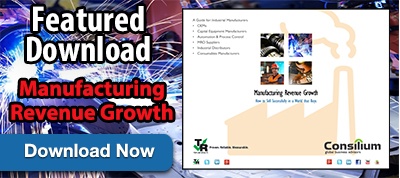It's not advertising
nor is it
Simply transactions
but rather
It's about applying your company's huge store of information & expertise to help educate prospects and customers so they can make informed decisions.
It's content marketing
Grab your tablet, mute your phone and shut down your mail client for 40 minutes to watch this powerful video from the Content Marketing Institute. It demystifies content marketing (or inbound marketing, digital marketing or as David Meerman Scott whose blog tipped me off to this video calls it, simply marketing.)
Oh, and by the way, done right it will change your company; cultivate one-on-one relationships in the market; and change your approach to business.
This isn't about adding a blog and twitter handle. It's not about SEO. And it's not about web development and graphic design. It's a little about the data.....but
This is about management consulting.
That may be a problem
 Many mid-size industrial manufacturing companies have a rather dim view of management consultants. (Probably viewing them with about the same regard as marketers!)
Many mid-size industrial manufacturing companies have a rather dim view of management consultants. (Probably viewing them with about the same regard as marketers!)
The skepticism of folks that actually invent and make stuff is understandable. Spreadsheets, 2X2 matrices and lavish expense accounts don't generate value. Effective consulting requires the ability to identify key issues, the perspective to envision great solutions, and the expertise to help achieve lasting change. Industry experience isn't an unalloyed benefit as it can often entail myopia. Rather broad business perspective and acumen allow great consultants to identify similarities between situations.
Translating content marketing to business vitality
Typically a conversation around content marketing turns into a discussion of keywords, topics, software and, in some cases, leads. Then it pretty quickly devolves into a discussion of how to actually produce content. Convinced that they "can't write" B2B companies hang up here. (The answer is a mental cleanse. Eliminating the jargon toxins like 'world class' and 'industry leading' allows them to have a conversation just like those that they have with real customers every day solving real problems. Maybe the solution is to try to figure out how to make your business content more like sports. Sports, in fact, seems to be the one thing that actually engages people enough to induce them to endure the indignity of intrusive ads and cable customer service! After all, what's the only printed paper you see in an airport men's room? The sports section.)
Those are important tactical topics - but solid management consulting approaches the challenge differently, asking questions like:
- How can content marketing be used to deepen the connection with customers?
- Can the business scale production? How quickly?
- What rate of growth can be financed and managed?
- What strategic goals are attainable beyond simple revenue growth? Increased valuation? Other strategic assets?
- How can marketing be used to identify disruptive opportunities while competitors pursue an incremental product roadmap?
- What are the implications to traditional sales channel?
- What new markets (vertical, global) can be reached feasibly that would have been prohibitively difficult before?
- Are there strategic partnerships? Acquisitions? that would make sense based on a broader industry perspective?
- How are the traditional organization and resource allocations of an industrial manufacturing business model misaligned with today's buyer expectations?
- How will the sharing economy change the business model?
- What are extreme (and likely) implications of 3D printing to the manufacturing and distribution model?
- Will IoT change customers' expectations of the value they expect from this product category?
- Is the right sales team in place to sell these types of leads?
- Is adequate data analysis capability in place? Can finance provide this? Do we need more?
- How will this effort position the business and owners for transition success / growth opportunity as boomers flood the market with businesses for sale?
- How do we create a "culture of content" in a product focused, technology based company?
Obviously there are many more - and the exact questions are dependent on the specifics in each case.
Want another tie in with content marketing? Not only should your digital marketing help position your company for strength as you wrestle with these issues, but your content should be helping to get your prospects thinking about how these sorts of questions/issues are going to be impacting their businesses! (And eventually maybe a bit of how you can help them win.)
The point is that content marketing is different than, for instance, SEO. The latter is a very technical, tactical discipline. Content marketing, in contrast, opens the door to an entirely different relationship with prospects and customers. That creates incredible opportunity for a company, it's owners and employees - as well as for the marketplace.
But the value can only be fully realized by applying the approach in conjunction with the depth and breadth of superb management consulting.
Want to learn more about how industrial manufacturing companies can apply the content marketing approach to their business growth? Download our free eBook here.
Diving Deeper Into the Evolving Role of Management Consulting in Business Administration and Strategy
The Landscape of Management Consulting Firms
 In recent years, the landscape of management consulting firms has evolved substantially. Traditionally seen as bastions of strategic consulting, these firms have expanded their repertoire to include a broad range of services. Management consulting services now encompass areas like operations consulting, supply chain optimization, and change management, reflecting the growing complexities of the business world.
In recent years, the landscape of management consulting firms has evolved substantially. Traditionally seen as bastions of strategic consulting, these firms have expanded their repertoire to include a broad range of services. Management consulting services now encompass areas like operations consulting, supply chain optimization, and change management, reflecting the growing complexities of the business world.
Many large management consulting groups have added digital and marketing services teams and product and customer research groups.
The Dynamics of Management Consulting Services
Management consulting services have evolved from offering generic solutions to providing tailored strategies that address specific challenges faced by client organizations. This shift has been driven by the need for more specialized knowledge in business administration and digital transformation. Consulting firms are increasingly focusing on delivering value that aligns with the unique objectives and cultures of their clients.
The Contributions of Management Consultants
Management consultants are key to executing these changing needs. They bring a blend of expertise and fresh perspectives to management teams, guiding them through complex business environments. The most effective management consultants are those who can balance analytical prowess with interpersonal skills, facilitating meaningful changes within organizations.
The Consulting Industry's Response to Market Needs
The consulting industry has responded to market demands by diversifying its offerings. Management consulting market trends indicate a growing demand for services that not only address immediate business needs but also lay the groundwork for long-term success and resilience. This includes strategies for digital transformation, sustainability, and navigating global market dynamics.
Operations Consulting: A Key Area of Expertise
Operations consulting has emerged as a critical area within the spectrum of management consulting services. By focusing on improving the efficiency and effectiveness of business processes, operations consultants help organizations streamline their workflows, enhance productivity, and ultimately achieve better financial outcomes.
The Broad Range of Consulting Team Expertise
A key strength of any consulting firm is the broad range of expertise within its consulting team. This diversity allows the team to approach problems from multiple angles, offering solutions that are both innovative and practical. The depth of knowledge in areas like supply chain management, business administration, and change management is particularly valuable.
The Importance of Independent Consultants
 The role of independent management consultants has also gained prominence in the management consulting firm landscape. These professionals offer a unique value proposition by providing objective, unbiased advice without the overhead and potential conflicts of interest associated with larger firms.
The role of independent management consultants has also gained prominence in the management consulting firm landscape. These professionals offer a unique value proposition by providing objective, unbiased advice without the overhead and potential conflicts of interest associated with larger firms.
Of course, it's true that clients often hire consultants to provide air cover for the changes that they're hesitant to make on my own, but feel emboldened to pursue with the imprimatur of management consulting.
Integrating Consulting Services with Client Organizations
Effective management consultants work closely with client organizations to ensure that the strategies developed are not only theoretically sound but also practically implementable. This involves a deep understanding of the client's organizational culture, business model, and market dynamics.
The Future of Management Consulting Market
Looking ahead, the management consulting market is poised for continued growth and evolution. As businesses navigate an increasingly complex and volatile global environment, the demand for high-quality consulting services is likely to grow. Management consulting firms that can adapt to these changes, offering innovative solutions and building strong relationships with clients, will be well-positioned for success.
The Role of Management Consultants in Business World Transformation
 Finally, the role of management consultants in the broader business world is significant. Their ability to facilitate change management, drive business strategy, and help organizations adapt to new realities makes them indispensable partners in the journey towards business excellence and sustainable growth.
Finally, the role of management consultants in the broader business world is significant. Their ability to facilitate change management, drive business strategy, and help organizations adapt to new realities makes them indispensable partners in the journey towards business excellence and sustainable growth.
The field of management consulting, with its diverse range of services and expertise, continues to be a critical component in the machinery of modern business administration. As organizations grapple with rapid changes and complex challenges, the insights and guidance offered by skilled management consultants and consulting firms become ever more valuable.



